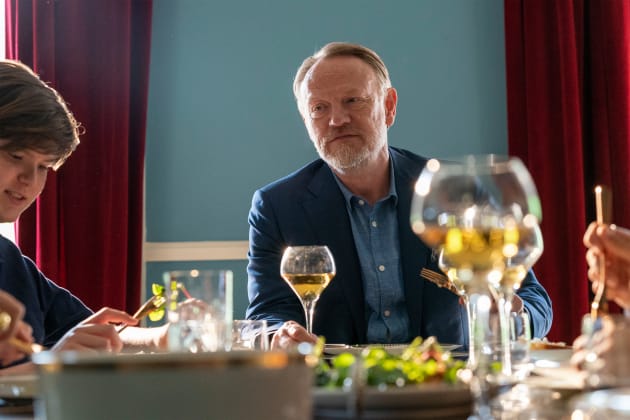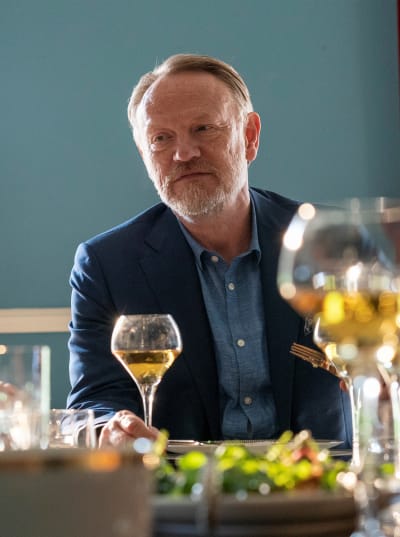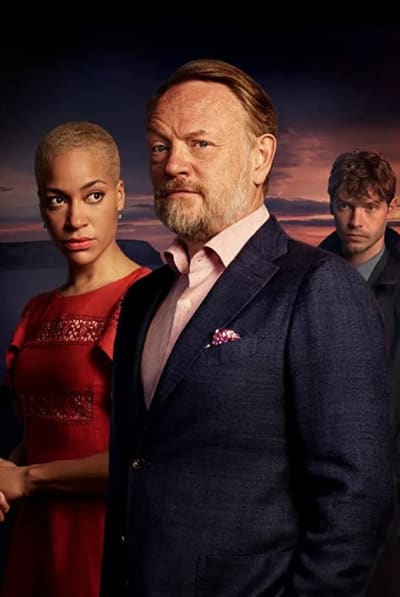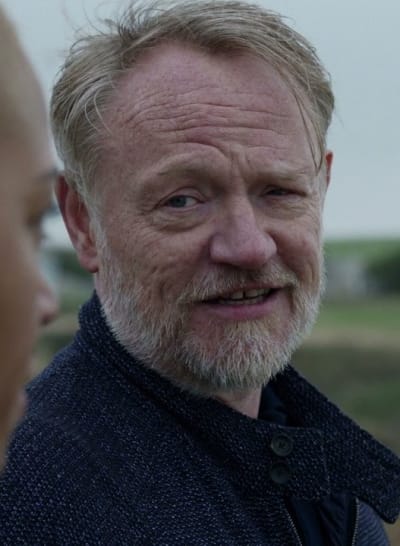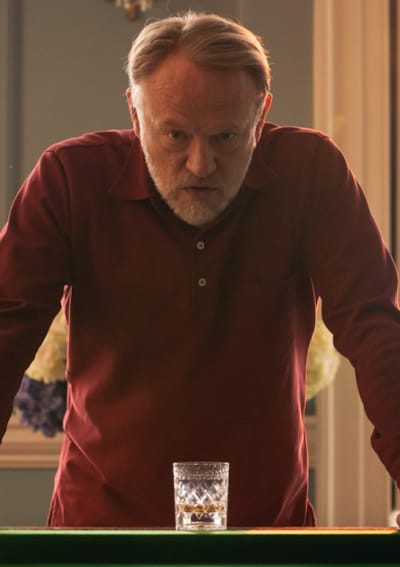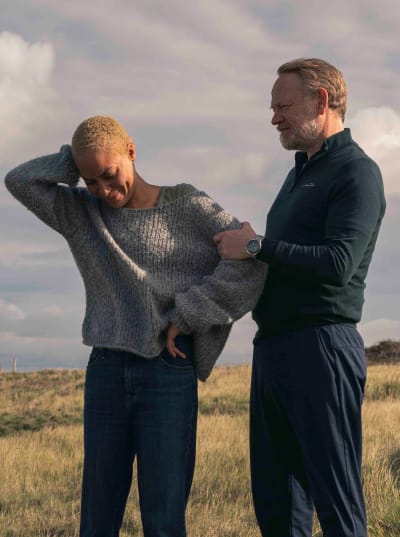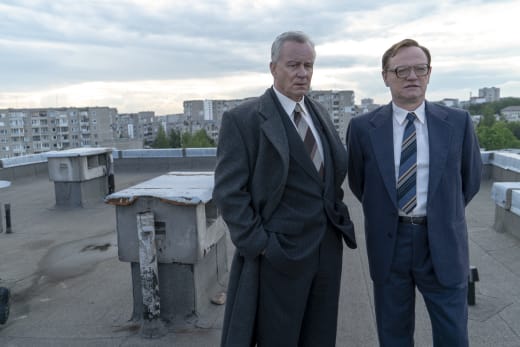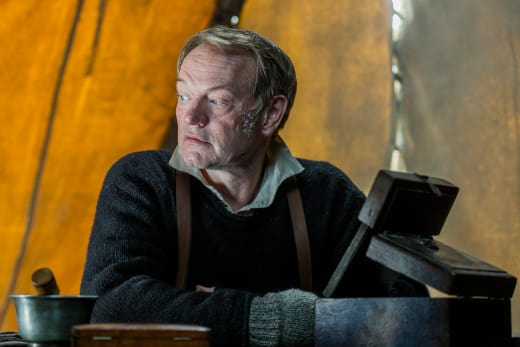Products You May Like
There are several reasons to tune into AMC’s The Beast Must Die, and Jared Harris is one of them.
Harris has a knack for picking roles that dig into your soul, and George Rattery does that with aplomb.
For Harris, the role has been kicking around for six years when series executive producer Nathaniel Parker was staying with him in Los Angeles.
He had just optioned the book, claiming it was the best thriller he had ever read, and there was a juicy part for Harris if he was up for it. Harris read the book, but his interest really increased when Gaby Chiappe was set as the series creator and writer.
Harris said, “For me, that’s the most important element. You want to feel as though you’re in the hands of someone who has something to say and knows how to say it. They have a point of view, and she was wonderful.”
Receiving the first script convinced Harris that it was on the right track, but it didn’t do much to help him with his role as George. George only appeared on the last page. He asked for another.
“When they finished that they sent it to me, and I got it. I understood what it was they wanted expected of me. And so, yeah. Then we were on board from there.”
In the series, Cush Jumbo OBE plays a woman named Frances that lost her son to a terrible hit and run accident. She fingers George as the culprit.
But it wouldn’t be much of a story if Frances nailed it out of the gate and easily took down a man she’s deemed the one responsible, so although George is, essentially, the beast from The Beast Must Die, George is far more complex than your average villain.
That angle was important to Harris.
Harris said, “Once you feel as though you’ve nailed a character down, particularly villains, then there’s no longer an investment in that personality or that story or that character and that we need to keep the ball in the air. So you didn’t quite know what you were getting from him. You didn’t know, is he the one responsible? Is he going to find out what she’s really after, before she figures out if he’s the one? There’s a cat and mouse involved.”
Harris continued, “What was an interesting choice was I suppose, because he had no conscience, you weren’t sure whether it was him because, obviously, someone would feel some responsibility. So maybe it wasn’t him. You know?
“So there’s always little games that you’re playing to try and keep that ball up in the air. But the most important thing is that you want to keep the audience guessing. You don’t want them to feel as though they’ve figured you out and they just write you off from that point.”
The audience’s relationship with the villain is important because of the role they play in the story.
“That’s the tough thing about playing villains. I mean, they’re largely there to service the story of the protagonist, and there’s not a lot of investigation of the mindset or the psychology of those characters. They’re really just to maintain momentum in the plot,” Harris said.
George certainly services Frances’ journey, but he’s got an independent journey of his own, too, which makes the story more layered and complete.
Harris is often drawn to the darker characters drawn with shades of gray that keep the audience guessing.
“I think that we all, as human beings, live in a gray world. I mean, there are days when we could be utter bastards and other days when we’re lovely, and we’re with joy to be around.
“Also, I’m attracted to ambiguous storytelling, where you’re not trying to stuff a story down the audience’s throat from day one. It’s that old, one-reeler Westerns, where you didn’t have audio.
“The good guy wore a white hat, and the bad guy wore a black hat. I mean, for Christ’s sakes, we’re past that surely. And we’re into sort of the nuance and complexity of character in psychology. That’s what’s interesting. That’s what keeps us attuned to a story.”
Harris frowns upon writers and directors without faith in the audience. You know the ones; they drop heavy handed clues to ease viewers in the right direction instead of allowing them to discover the mystery on their own.
“I think quite often people make a bad assumption about audiences, which is that the audiences aren’t sophisticated. We’re tremendously sophisticated about how we consume narrative, tremendously smart about it, without even realizing it. And we are constantly ahead of where we think we’re being led in a story.
“And if you always arrive where the audience is expecting you to arrive, they switch off because somebody else’s has figured out a better way of telling a story. You’ve got to challenge yourself as storytellers, and then you decide on what your plot is, and then you decide, well, what’s the most interesting way of telling the story?”
As an entertainment anglophile, it seems that the British have nailed the genre of the murder mystery and the limited series in general.
Harris laughed saying, “We do love our murders, don’t we? We love our little murder stories.” He also also thinks that since the US often relies heavily on broadcast networks, that the blueprint is more sensational to keep viewers tuned in.
“You got your confines of trying to tell a whole story within the hour with your ad breaks, and you’ve got to have cliffhangers. I think they always tend to be more violent, as well. The American approach to drama … It’s just a more violent culture, I guess.”
There’s something to be said about that. British murder mysteries are more interested in the psychological aspects of the crime and how it impacts those trying to solve the case. In the US, we’ve recently had The Undoing and Mare of Easttown on HBO, but they’re the exception rather than the rule.
Harris said, “But with the British, I suppose it goes way back to Agatha Christie and the Sherlock Holmes. The murder itself isn’t as important as whenever you start to get into these stories, there’s this incredibly complicated, dense web of relationships, and it’s sort of fetid swamp of humanity that underlies these stories.
Harris and Jumbo had not worked together in the past, but they got on really well, and he thinks she’s great.
“I used her full title every time I spoke to her. Good morning, Cush Jumbo OBE. Not that she asked for it, but I thought that was respectful. I mean, Cush had a very, very, very tough role. I mean, an actor, these parts are great parts, but boy, does it take it out of you.
“Every day, you show up to set, and you put yourself through hell. So I was just mindful of the toll that it was taking on her and trying to help her in whatever way that I could help her. And she helped me, as well. So I think she’s wonderful. She’s wonderful in it, incredibly subtle, so much going on.
“And again, part of that was an awareness whilst we were shooting, that I had to give her the ability to do some of that stuff. Because if I’m staring at her all the time, how is she going to create that moment where she’s going to have the facade drop and the audience can see that other side?
“So I needed to just do the choreography. I needed to be able to disconnect from her so she could have those private moments. And she did the same for me.”
The result is an emotional mystery that keeps you guessing until the very end, and a lot of that depended on Harris and Jumbo working together to allow the audience to to feel what their characters were experiencing at the same time they experienced it.
Harris has had some incredible roles in his career, but there are still some that he would have liked and that he’d still like an opportunity to sink his teeth into.
For example, he auditioned for Rorschach in Watchmen, which he didn’t get although he enjoyed the comics. What he’d like to do is play Ulysses S. Grant in a story about him.
“I was fascinated by Ulysses S. Grant, how his story is now re received. I mean, he has not benefited from history at all in terms of what he accomplished.”
And on the day of our interview, Apple TV+ dropped the first trailer for Foundation, an upcoming sci-fi series in which Harris plays Hari Seldon, who fits right into the complex character narratives that draws him into their tangled web with a whole lot of gray areas.
“He’s the protagonist; he’s the person who starts that whole ball rolling. I played someone who’s like out and out [he pauses] I mean, even Valery Legasov [Chernobyl], obviously, he was compromised. Crozier [The Terror] was a drunk with a huge chip on his shoulder, and embittered, deeply embittered. I think it’s difficult. I think it’s hard. These parts are hard to play.
“It’s interesting that if you look at say Tom cruise, wonderful, wonderful, wonderful actor. It’s tough to play a character who starts off from this sort of position of wholesomeness and goodness.
“And if you want a journey in the story — and he’s tremendously good at that — if you look at the journeys that his character takes in Edge of Tomorrow, or Jerry McGuire or whatever, or Magnolia.
“Saints are very, very difficult parts to play because you find out everything you’re ever going to find out about them quite quickly, and then nothing else happens.”
That doesn’t necessarily equate to his joy playing the less saintly characters. In fact, he finds that the Cruises of the world might have a more difficult time tapping the stronger components of the characters they play. But it all works out in the end.
“I mean, if you’re playing a saint, you have to find the darker colors and the undercurrent. And if you’re playing someone who’s a villain or a bad guy, you have to complete the picture. You have to find the other qualities to round out the experience.”
Harris has been at the pinnacle of his craft for the last decade, adding unexpected nuance to complex characters. His role as George Rattery in The Beast Must Die is no exception.
Don’t miss Harris’ latest strong performance. Tune into The Beast Must Die on AMC+ tomorrow or catch the linear AMC network premiere on Sunday, July 12 at 10/9c.
Carissa Pavlica is the managing editor and a staff writer and critic for TV Fanatic. She’s a member of the Critic’s Choice Association, enjoys mentoring writers, conversing with cats, and passionately discussing the nuances of television and film with anyone who will listen. Follow her on Twitter and email her here at TV Fanatic.
